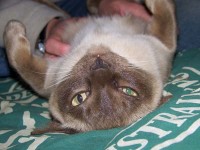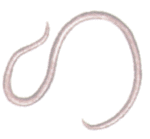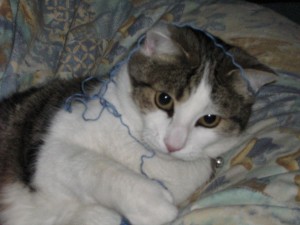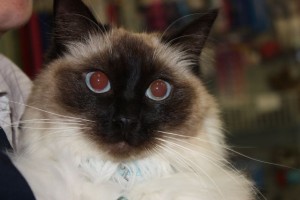FIV (Feline Immunodeficiency Virus) is prevalent in Australian cats but testing positive for FIV is not the same as having feline AIDS.
Feline AIDS describes the terminal stages of disease which may not occur for many years – or at all! A positive FIV test means that your cat has been infected by the virus.
Are my family at risk?
No. Although FIV belongs to the same family of viruses as HIV in people, it only infects cats. There is no risk of cross infection of either virus between species.
Are other cats in the household likely to be infected?
The virus is shed in the saliva of infected cats and spread by biting. Cats with a history of cat bite abscesses are more likely to test positive for FIV.
Spread between cats in a household is unlikely unless they fight. Normal social interactions such as grooming rarely transmit FIV.
The best way to minimise the chances of FIV infection is to confine uninfected cats indoors away from aggressive cats.
How is FIV diagnosed?
FIV is diagnosed with a blood test at the surgery which detects an immune response (antibodies) to the virus. If this test is positive your cat is infected.
Kittens with immunity passed on from their mother may test positive until 4 months of age. If a young kitten tests positive we retest them at six months of age.
Will my cat recover?
Once a cat is infected with the virus it remains infected for the rest of its life but not all infected cats become ill.
What diseases does FIV cause?
Like HIV, FIV suppresses the body’s defences so that the cat is vulnerable to diseases it would normally defeat. The cat is vulnerable to chronic or recurrent infections that fail to respond to regular treatment.
These include:
- Inflammation of the mouth and tongue leading to appetite loss, drooling and mouth pain
- Weight loss
- Poor appetite
- Fever
- Signs of brain dysfunction such as aggression, unequal pupils, convulsions and behavioural changes
- Swollen lymph glands
- Unusual infections like toxoplasmosis, cryptococcosis, chronic flu, pneumonia, skin disease
- Tumours especially those of the lymph system
The non specific signs of weight loss, poor appetite and fever occur in many diseases of cats and are usually unrelated to FIV. Cats with FIV are more likely to suffer from these signs and diseases more often and be less able to throw them off even with treatment.
FIV positive cats have a shorter life expectancy on average than FIV negative cats.
Is there any treatment?
Secondary infections with bacteria or fungi are treated with antibiotics and anti-fungals but no specific treatment for the virus is available. Trials with anti-HIV drugs such as AZT have reduced mouth inflammation in affected cats but the cost and availability of AZT makes its use in general practice difficult at present.
Anti-inflammatory treatment reduces mouth inflammation and peps up the appetite in many cats.
Should I have my cat euthanased?
Certainly not on the basis of a positive FIV test! Like humans with HIV, cats with FIV appear healthy and happy for a long time before getting sick.
On the other hand if your cat has succumbed to multiple infections, is no longer responsive to treatment or is suffering from a chronically painful mouth then euthanasia is the kindest solution.
How can I help my cat?
Confinement indoors of an FIV positive cat reduces the risk of infection with other agents. It also reduces the risk of transmission of the virus to other cats.
A good quality, highly palatable diet as well as worming every 3 months and at least annual health checks will enhance the disease free period.
Infections require prompt and aggressive treatment.
How do we prevent FIV infection?
Desexing and confinement indoors, especially at night, reduces fighting and therefore the risk of infection. We recommend vaccination with FIV vaccine for all cats with access to the outdoors. Cats older than 6 months of age are tested for FIV before the first vaccination. A series of three primary vaccinations is given 2-4 weeks apart and then a booster is given annually.
 Research shows that most dog owners are not aware of the risk of heart failure in older dogs, even though 1 in 10 dogs presented to vets suffer from heart disease.
Research shows that most dog owners are not aware of the risk of heart failure in older dogs, even though 1 in 10 dogs presented to vets suffer from heart disease.




